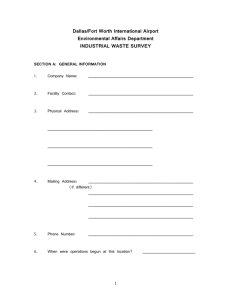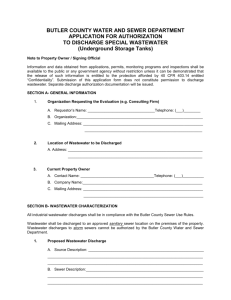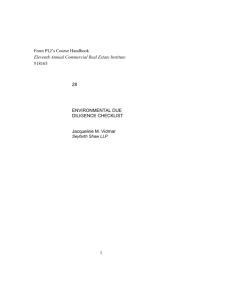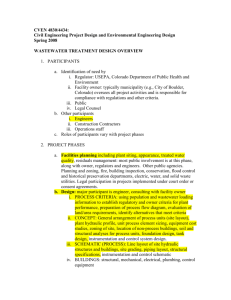Industrial Wastewater
advertisement
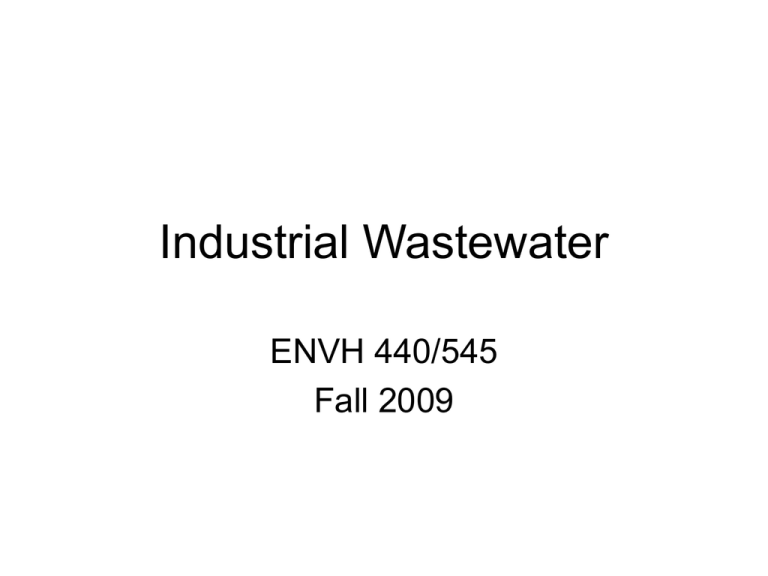
Industrial Wastewater ENVH 440/545 Fall 2009 Outline • Regulations governing industrial wastewater discharges • King County industrial wastewater limits • Industrial wastewater treatment processes • Typical Washington industries that discharge directly to waterways (NPDES permits) • Examples of areas impacted by industrial wastewater Industrial Wastewater • The water or liquid carried waste from an industrial process • These wastes may result from any process or activity of industry, manufacture, trade or business, from the development of any natural resource, or from animal operations such as feedlots, poultry houses, or dairies • The term includes contaminated storm water and leachate from solid waste facilities • Waste material (solid, gas or liquid) generated by a commercial, industrial or nonresidential activity Regulations • Federal Clean Water Act (CWA) mandates regulation of discharge of pollutants to any waters – Nonpoint – Point – Stormwater • Discharge limitations established for conventional, nonconventional and toxic pollutants Regulations (continued) • Conventional pollutants can include – – – – – BOD Total suspended solids pH Fecal coliforms Fats, oil and grease (FOG) • Toxic pollutants can include – Metals (arsenic, cadmium, chromium, copper, lead, mercury, nickel, silver, zinc) – Toxic organics (see Appendix B to 40 CFR 65) • Voloatile organics (1,1,1-trichloroethane, benzene, ethylbenzene, methylene chloride, toluene, and trichloroethylene) • Semi-volatile organics (di-n-butyl phthalate, naphthalene, p-chloro-m-cresol, and phenols) • Pesticides • Polychlorinated biphenyls (PCBs) • Noncoventional pollutants can include – Ammonia – Phosphate Regulations (continued) • Many industries discharge to a sanitary sewer that goes to a municipal treatment plant (POTW) • Industrial discharges regulated by authority operating the POTW • Many POTWs have an industrial waste pretreatment program to control industrial discharges • Industry may be required to obtain a discharge permit or authorization, depending on type of waste • Industry may be subject to Best Management Practices (BMPs) to control and treat wastes • POTWs designed to handle typical municipal wastes using settling and biological treatment Best Management Practices • BMP: Goal is to prevent or reduce the discharge of pollutants to water – – – – Industry can look at overall processes Scheduling of activities Prohibitions of practices Maintenance procedures • Before a municipality will allow an industry to discharge their waste down sewer system, they may ask BMP are being followed or can be improved Best Practicable Control Technology • The first level of technology-based standard (e.g., the standard is determined by the type of technology used) established by the CWA to control pollutants discharged into water – Set up to be driven by technology rather than by water quality standards • BPT effluent limitation guidelines are generally based on the average of the best existing performance by plants within an industrial category or subcategory Regulations (continued) • Some industrial waste constituents are not compatible with POTWs – – – – Upset biological processes (e.g., sudden high organic loads) Damage treatment equipment (e.g., acidic or caustic wastes) Are not removed, passing through to effluent or sludge (e.g., metals) Create hazardous conditions in sewers and for workers (e.g., explosive materials such as benzene or hydrogen sulfide gas) • POTWs must develop and enforce local limits for industrial discharges • POTWs limits must equal or be more stringent than EPA’s established standards • Categorical Industries – EPA has established discharge limitations for specific industries – Categorical industries must obtain a discharge permit • Hospitals are viewed as industrial dischargers and must follow BMPs for hospitals as an industry – Canadian Centre for Pollution Prevention has good web site for medical wastes – http://www.c2p2online.com/main.php3?section=83&doc_id=169 Regulations—Typical Categorical Industries • • • • • • • • • • Aluminum forming Metal foundries Battery manufacturing Nonferrous metal manufacturing Coil coating Pesticide manufacturing Copper forming Petroleum refining Electrical/electronic components Pharmaceutical manufacturing • • • • • • • • • Electroplating Circuit-board manufacturing Porcelain enameling Iron/steel manufacturing Pulp/paper mills Leather tanning finishing Wood preserving Metal finishing Inorganic chemical manufacturing • Centralized waste treatment Pretreatment Program Implementation • Types of pretreatment include: – – – – – pH neutralization Temp regulations Solids separation Toxic metal removal Oil and grease • The main components of the IPT program include: – – – – – 1) Establishment of Technically Based Local Limits (TBLLs) 2) Permitting 3) Inspection 4) Sampling 5) Enforcement King County Limits–Metals Parameter Daily Average Maximum Instantaneous Maximum mg/l (ppm) mg/l (ppm) Arsenic 1.0 4.0 Cadmium 0.5 0.6 Chromium 2.75 5.0 Copper 3.0 8.0 Lead 2.0 4.0 Mercury 0.1 0.2 Nickel 2.5 5.0 Silver 1.0 3.0 Zinc 5.0 10.0 Cyanide 2.0 3.0 King County Fats, oils and greases • Two types: • 1) Nonpolar FOG (petroleum or mineral origin) – <100 mg/L of discharge waste – May require an oil/water separator • 2) Polar FOG (animal or vegetable origin) – No visible floating polar FOG • FOG can harm the biological phase of sewage treatment • Block sewer systems • The final FOG destination is either landfills or it can be recycle. – Bio-diesel: (You can get a recipe on-line) • But not always an option • still in experimental phase – Sold to other companies to make soap and cattle feed King County Limits Corrosive Substances • Maximum limit is pH 12 • Minimum limits • The instantaneous minimum pH limit – is violated whenever any single grab sample or any instantaneous recording is less than pH 5.0. • The daily minimum pH limit – is violated whenever any continuous recording of 15 minutes or longer remains below pH 5.5 or when each pH value of four consecutive grab samples collected at 15-minute intervals or longer within a 24-hour period remains below pH 5.5. • Stay between a pH of 5.0-12! Explosimeter/Combustible Gas Indicator • No pollutant that creates a fire or explosion hazard in sewer or treatment works – Closed-cup flashpoint <140°F – Two successive readings on an explosion hazard meter, taken at the point of discharge into the system or at any point in the system • Less than 5 percent of the Lower Explosive Limit (LEL) of the meter – Any single reading must be less than 10 percent of the LEL King County Limits Organic Compounds • No organic pollutants that cause toxic gases, vapors or fumes in the sewers or at treatment plant (40 CFR Section 433.11) – E.g., Acetone, MEK and xylenes • Limits for industries are established on a case-by-cases basis: Organic Compounds (cont.) 1. Conditions in public or private sewers downstream of the discharge, including dilution by other wastes upstream; 2. Worker safety and public health standards; 3. Type of chemical compound (toxicity, volatility, solubility); 4. Reactivity: Proximity to other discharges that may cause adverse conditions in combination with the discharge in question; 5. Removal of compound: Technological achievability of removal; and 6. Potential impacts to public, private, or side sewers; treatment works; biosolids; or receiving waters. Hydrogen Sulfide • Atmospheric hydrogen sulfide <10.0 ppm at a designated manhole – Wastewater can go anaerobic thus create a lot of hydrogen sulfide—can kill sewer workers if they do not have proper equipment—CAUTION! • Limitations are established with similar reasoning as for organic compounds, but existing [H2S] are considered – Less than 7 mL per L of solids capable of settling – Foods wastes must pass a ¼” screen opening – Temperature <65-degrees C King County Limits • Atmospheric hydrogen sulfide <10.0 ppm at a designated manhole • Less than 7 mL per L of solids capable of settling • Foods wastes must pass a ¼” screen opening • Temperature <65-degrees C King County Limits • Dental line discharges – Concerned with mercury and silver – Certain practices are exempt (e.g., orthodontics that place/remove amalgam <3 days/year) – Most must install an amalgam separator, filters to remove silver and follow best management practices, or – Apply for discharge permit and submit routine monitoring results King County Limits • BMPs – Keep amalgam out of sink – Don’t wash amalgam down drain – Clean and service vacuum pumps regularly – Send amalgam waste to licensed handler – Maintain records for 3 years Dental Traps Industrial Wastewater Treatment • Physical/chemical treatment • Biological treatment • Thermal treatment Treatment needed will depend on the type and concentration of pollutants in the wastewater Physical/Chemical Treatment • Oil / Water Separators Physical/Chemical Treatment • Clarifiers — similar or same as used for domestic wastewater treatment • Catch basin or sump Physical/Chemical Treatment • Chemical precipitation (followed by settling) – Large variety of coagulants • • • • • Ferric chloride Lime Polymers Alum Acids/bases to adjust pH – Many times performed on a batch basis (e.g., store all wastewater for one day, then batch treat in single tank. Discharge settled liquid, store sludge for a week then have it picked up by licensed TSDR (treatment, storage, disposal or recycling facility) Physical/Chemical Treatment • Filtration – Needed for particles that are small or have similar density as water – Typically small pressure cartridge-type filters for small flows, larger pressure units for larger flows Physical/Chemical Treatment • Ion Exchange (common for metals, nitrate) • Evaporation • Oxidation – Used to oxidize organics like phenols or inorganics like cyanide – Oxidants include sodium hypochlorite, hydrogen peroxide, potassium permanganate, and ozone • Reduction – Example: convert Cr+6 to Cr+3 prior to chemical precipitation as a hydroxide – Sodium bisulfite or ferrous iron common reducing agents Physical/Chemical Treatment • Air stripping for removal of volatile organics • Granular activated carbon adsorption – Used for removal of numerous organic compounds • Membrane separation – Numerous applications, improving technology Thermal Treatment • Incinerate on or off-site – Involves combustion of waste material to convert into heat, gas, steam and ash – Not used as much because of the discharge of hazardous materials into air are controlled – Regulations are different by state • Must be licensed for air pollutant discharges and disposal of ash • Expensive, typically only used for solid wastes or sludges Biological Treatment • Pollutant removed/converted by biological treatment – Oxygen-consuming pollutants (BOD, COD, ammonia, organic nitrogen) – Suspended solids – Nutrients (nitrogen and phosphorous) Biological Treatment • Standard Processes – Activated sludge – Trickling filter • More advanced processes for difficult wastes (high organics or wastes containing particular types of organics that can be degraded biologically under controlled conditions) Biological Treatment • Anaerobic treatment: Provides volume and mass reduction by the breakdown of organic material by microbes in the absence of oxygen • Key steps are: – Hydrolysis – large molecules/polymers such as polysaccharides and proteins are converted to smaller compounds – Acidogenesis – conversion of small compounds to Volatile Fatty Acids (VFA) by anaerobic digestion – Methanogenesis – Volatile Fatty Acids are broken down by methanogenic bacteria to methane and CO2 • Common for meat and food processing industries • Effluent requires additional treatment if discharge to a waterway is required Biological Treatment • Anaerobic treatment – Numerous process configurations – Upflow anaerobic sludge bed (UASB) reactors are common Biogas Treated Effluent Gas collectors Sludge Blanket Influent Rising Biogas Biological Treatment • Submerged fixed film (biofilm) reactors – Aerobic process – Biofilm attached to a solid media (plastic, burnt clay, etc.) Biological Treatment • Sequencing Batch Reactors – Activated sludge on a batch-wise basis fill aerate (mix) settle Slow / fast fill with / without O2 supply Until – C removal – Nitrification completed Denitrification (anaerobic) Allow biological solids to settle drain Small / large portion idle If no wastewater available Biological Treatment • Complete system diagram for an petrochemistry wastewater Biological Treatment • Onsite disposal systems are not suitable for industrial wastewaters • Septage haulers typically must be licensed and haul septage to an approved treatment facility (like a POTW) Washington Industries that Discharge Directly into a waterway • Pulp and paper mills – all but one mill is located in Western WA • Aluminum smelters: – There are 5 in WA – Four of these are located on the Columbia River (the last is located in Ferndale) • Chemical plants (generally associated with pulp and paper mills) • Oil refineries: Ferndale, Anacortes, Tacoma, This map (updated 7/2006) does not include all of the smaller facilities regulated by the Industrial Section Improper Discharge by Industries? • EPA orders Pepsi Bottling Group to correct stormwater, industrial wastewater violations on Oahu – The EPA action cites the lack of a permit to discharge stormwater from the company's facility and associated unauthorized site stormwater discharges, which enter Halawa Stream and Pearl Harbor's East Loch. Pepsi Bottling also sent acidic industrial effluent to the city and county of Honolulu's sewers in violation of the low pH requirement under the EPA's general pretreatment regulations. • EPA Slaps Firm With $4.3 Million Fine for Wastewater Violations – Keysor-Century Corporation knowingly released toxic wastewater into the Santa Clara River and emitted cancer-causing air pollutants at high levels, while falsifying emission reports to state and federal agencies. Penobscot Indian Nations of northern Maine • Paper Milling Industry located upstream • – Fish caught in the Penobscot River are contaminated with mercury, dioxin, and PCBs "Today's Penobscot, with discolored waters and carrying scum and exhaling offensive odors, repels sportsmen and other recreationists. Few fishermen will wet a line in such waters and fewer still will eat fish taken from these waters. Downstream from Bangor, the Penobscot is so severely polluted that boats cannot be kept in the river because of the way the river fouls the paint." Richard E. Griffith, Regional Director, Bureau of Sport Fisheries and Wildlife, U.S. Dept. of the Interior (U.S. FWPCA, 1967). Homeland: Four Portraits of Native Action

